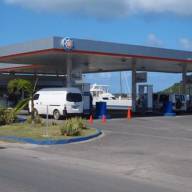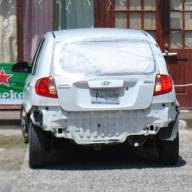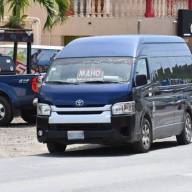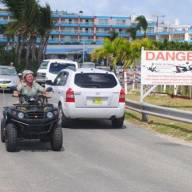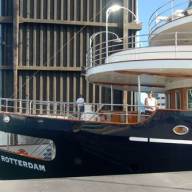St. Martin - St. Maarten car rental scams are a sad truth. Our island's rental car industry is highly competitive - brutally so. On St-Maarten.com, we only recommend rental car providers with good business practices. We know the management of all companies we present on this site.
In the past, there were strong tax incentives for French overseas territories, and among the sectors supported were rental cars. This led to an over-saturation of the St. Martin - St. Maarten car rental market. Estimates say that there are more than one hundred thirty car rental companies registered on tiny SXM.
Competition creates fair market prices, or so the rule goes. But if there is too much of it, the individual players have to turn into sharks to survive.
Don't Be Fooled by Super Low Rates - Avoid St. Martin - St. Maarten Car Rental Scams
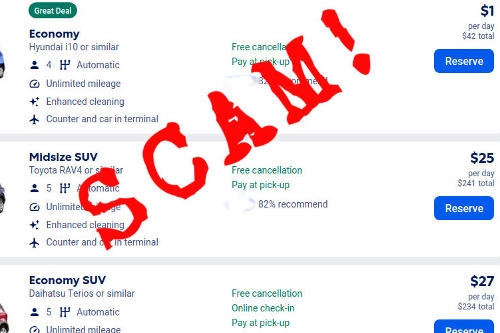
This is why searching for a decent rental car deal is such a gamble for travelers. If the advertised rate is fantastically low, renter beware. There comes the point where the daily charge is so low that common sense screams that it's impossible. Nobody can rent out a decent car for - say - $11 per day. Even if the car is rented out 70% of the year (which it's not), how should an operator make his lease payments for the vehicle, pay the exorbitant monthly rent for the tiny booth at the airport, pay the crazy rent for any commercial property alongside Airport Road, pay staff and finally make a profit? Did you know that rental car operators have to pay up to 30% commission to online booking engines?
St. Martin - St. Maarten Car Rental Scams to Watch Out For
Of course, the companies offering absurd discounts can't survive on these rates. So, they find other ways to make up for cash flow.
- One example is the famous passenger side door-lock scam: when taking over the car, renters check with the company's representative for scratches and dents and have them marked on the rental form. Nobody checks the passenger side door lock. Once the car is returned, the representative 'discovers' that the lock has been tampered with. It's now the customer's responsibility to fix the damage: $280 will be subtracted from the deposit. Of course, the lock will never be repaired. The next customer will pay again.
A recent survey among the larger fleets on the island shows that about 70% of the right-hand locks are damaged. We are talking about vehicles that are all cleaned up and ready for the next customer - including their busted locks, which will help to triple the published rate. - The part of a car body below the doors is called 'rocker panel'. If a panel is dented, it can only be spotted by stepping back from the vehicle. In a typical rental situation, the car is inspected with the customer and the company's representative. Any damage will be noted on a form and the customer has to sign off on it. Nobody steps back to check the rocker panels. Once the car is returned, the representative will come with the shocking news that the rocker panel is damaged. Say bye bye to your $1,000 deposit. This rocker panel will never be repaired and earn the company over the years more money than the car is worth.
The bottom line is: The traveler is baited with a low rate. A deposit of around $1,000 will be provided through the customer's credit card. The traveler will not see this money again. This will be a very costly St. Martin - St. Maarten car rental!
Upselling services is another common strategy to bring back a reasonable value to a rental contract. The soft approach is entirely legit. But we observe that travelers are strong-armed: Imagine you arrive at St. Maarten after a long flight, late in the day. The van of your rental car provider takes you, your spouse, and your luggage to the main office. Once you start the paperwork, the clerk will insist on adding 'mandatory' liability insurance to the contract. (By law, all cars have liability insurance, so you are being lied to that you have to pay for it.) You refuse. 'No car' is the response. So, now you are in a foreign country, on a busy road with luggage but no transport. Reluctantly and maybe even in anger, you agree and double or triple the cost of renting the car.
Another additional insurance is called Collision Damage Waiver or CDW. This is a major moneymaker for car rentals; these companies are all self-insured, which translates into them not having any insurance. They pocket the fees they charge (typically $14/day), and if there is some damage to swallow, the in-house mechanic or body-man will fix it for a fraction of the price of a dealership. In most parts of the world, the CDW does not carry any deductible. Not so on our island: here, the customer still has to cover between $800 to $1,500, and the CDW only kicks in for damages above this amount. The trouble is that on our slow traffic island, few accidents cause dramatic damage. Most fender-benders can be fixed for much less than the standard deductible, turning the CDW into wasted money.
St. Martin - St. Maarten car rental scams can be extremely damaging to the customer's valet. If a rental cars get stolen, especially the economy models from Hyundai and the ordinary types from Toyota, the customer has to pay for the car. Therefore: If possible, try to get a less popular model, because this car won't be a target for thieves. Please remember: if you don't pay for the CDW and comprehensive coverage, you have to replace the stolen vehicle with your money!
Car Rental Companies With Good Reputation
The rental car providers listed on St-Maarten.com all have a long history of doing honest and legitimate business. Trust our partners such as Leisure Car Rental and Starlite Car Rental.








